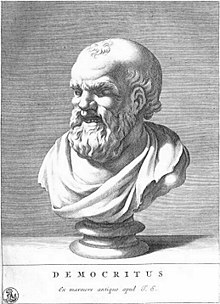Democritus of Abdera
| Democritus | |
|---|---|
 |
|
| Born | c. 460 BC Abdera, Thrace |
| Died | c. 370 BC (aged around 90) |
| Era | Pre-Socratic philosophy |
| Region | Western philosophy |
| School | Pre-Socratic philosophy |
|
Main interests
|
|
|
Notable ideas
|
|
|
Influences
|
|
Democritus (/dɪˈmɒkrɪtəs/; Greek: Δημόκριτος, Dēmókritos, meaning "chosen of the people"; c. 460 – c. 370 BC) was an influential Ancient Greek pre-Socratic philosopher primarily remembered today for his formulation of an atomic theory of the universe.
Democritus was born in Abdera, Thrace, around 460 BC, although, some thought it was 490 BC. His exact contributions are difficult to disentangle from those of his mentor Leucippus, as they are often mentioned together in texts. Their speculation on atoms, taken from Leucippus, bears a passing and partial resemblance to the 19th-century understanding of atomic structure that has led some to regard Democritus as more of a scientist than other Greek philosophers; however, their ideas rested on very different bases. Largely ignored in ancient Athens, Democritus is said to have been disliked so much by Plato that the latter wished all of his books burned. He was nevertheless well known to his fellow northern-born philosopher Aristotle. Many consider Democritus to be the "father of modern science". None of his writings have survived; only fragments are known from his vast body of work.
Democritus was said to be born in the city of Abdera in Thrace, an Ionian colony of Teos, although some called him a Milesian. He was born in the 80th Olympiad (460–457 BC) according to Apollodorus of Athens, and although Thrasyllus placed his birth in 470 BC, the later date is probably more likely.John Burnet has argued that the date of 460 is "too early" since, according to Diogenes Laërtius ix.41, Democritus said that he was a "young man (neos)" during Anaxagoras's old age (c. 440–428). It was said that Democritus's father was from a noble family and so wealthy that he received Xerxes on his march through Abdera. Democritus spent the inheritance which his father left him on travels into distant countries, to satisfy his thirst for knowledge. He traveled to Asia, and was even said to have reached India and Ethiopia.
...
Wikipedia
